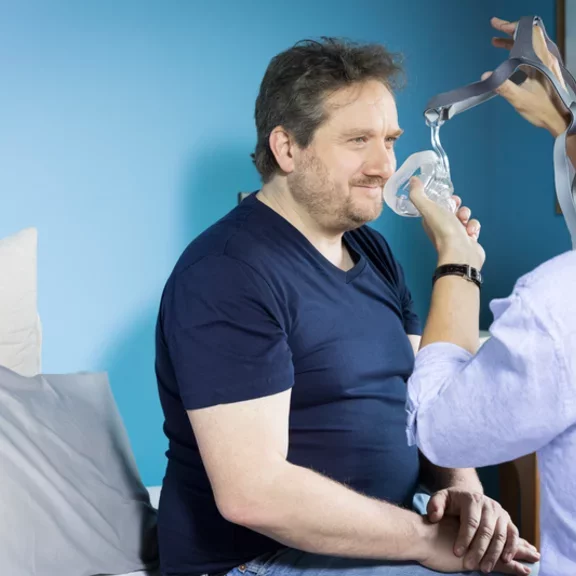OHS
Obesity Hypoventilation Syndrome
Obesity hypoventilation syndrome (OHS) is a condition caused by being overweight.
In patients who are overweight their breathing muscles are unable to work properly which is especially evident overnight.
- Worldwide, nearly one out of three adults are overweight (BMI ≥25 kg·m−2) and almost one in 10 adults are obese (BMI ≥30 kg·m−2).
- In Ireland one-quarter of adults are obese and 61% of adults are overweight or obese.
- Ireland ranks 9th of 53 European countries for obesity in adults and 11th for overweight and obesity.
What are the symptoms of OHS?
The symptoms of OHS are usually caused by a lack of sleep and a lower than normal oxygen level in your blood.
Symptoms can include:
- Day-time — sleepiness, lack of energy, breathlessness, headache, depression.
- Night-time — loud and frequent snoring during sleep and/or breathing pauses (when you stop breathing for short periods of time). These may be concerning to your bed partner. Your bed partner may be the only one who sees or hears your night-time symptoms.3
Diagnosis
Your healthcare provider will diagnose your OHS by first taking a complete history of your symptoms, including:
- your sleeping habits,
- checking your body mass index (BMI),
- measuring your oxygen and carbon dioxide levels.
- Your height and weight are used to calculate your BMI. A BMI of 30 or over is considered obese.
Your oxygen and carbon dioxide levels are measured by taking a blood sample from your artery, usually your wrist. A pulse oximeter can be used to get an estimate of the amount of oxygen (but not Carbon Dioxide). Pulse oximetry however is not as accurate as a blood sample from your artery (ABG).
A chest x-ray and pulmonary function tests may be done to rule out any other causes of your breathing difficulty. Although not necessary to diagnose OHS, a sleep study is usually ordered (this is called polysomnography). If you are suspected to have OHS, you need to see if you have sleep apnoea and how severe it is.
References
- Obesity hypoventilation syndrome - Juan F. Masa, Jean-Louis Pépin, Jean-Christian Borel, Babak Mokhlesi, Patrick B. Murphy, Maria Ángeles Sánchez-QuirogaEuropean Respiratory Review 2019 28: 180097; DOI: 10.1183/16000617.0097-2018 https://err.ersjournals.com/content/28/151/180097
- Obesity Hypoventilation Syndrome - Safal Shetty, Division Pulmonary, Allergy, Critical Care and Sleep Medicine, Department of Medicine, University of Arizona, 1501 N Campbell Ave., Rm 2342D, Tucson, AZ 85724, USA, Tel: 520-626-6109, Fax: 520-626-1876; Published online 2015 Feb 1. doi: 10.1007/s13665-015-0108-6
- Am J Respir Crit Care Med Vol. 189, P15-P16, 2014 - Authors: Vidya Krishnan MD, MHS and Pedro Genta MD Reviewers: Suzanne Lareau RN, MS, Bonnie Fahy, RN, MN, CNS, Maximiliano Kakazu, MD, Atul Malhotra MD, Babak Mokhlesi MD MSc, Helena Schotland, MD, Marianna Sockrider MD DrPH

